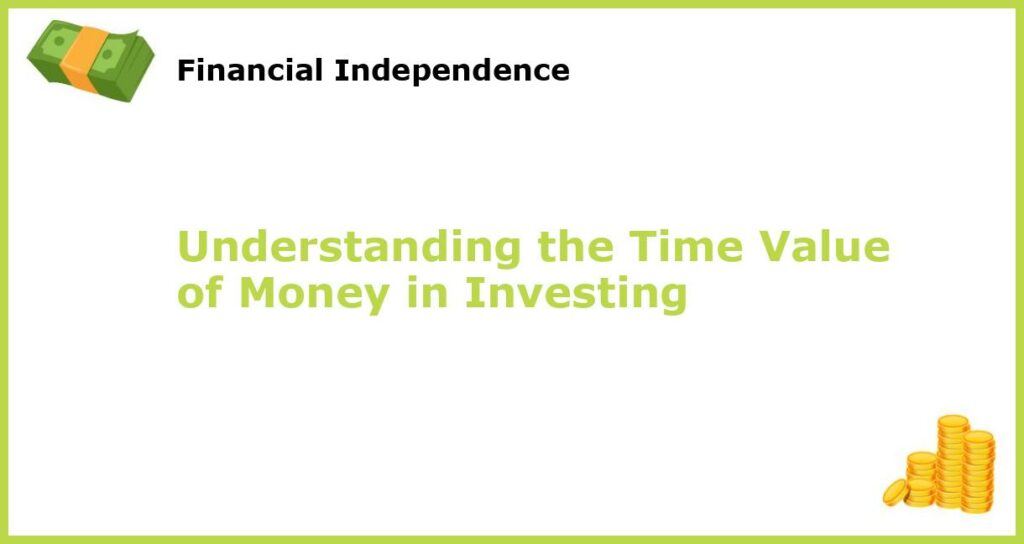Investing can be a complex and daunting task for many people. However, understanding the time value of money is a fundamental concept that can help investors make informed decisions that maximize their returns and achieve their financial goals. In this article, we will explore the various factors that affect the time value of money and how they can impact investment decisions.
The Basics

The time value of money refers to the idea that money today is worth more than the same amount of money in the future. The reason for this is that money can earn interest or be invested in assets that generate returns over time. Therefore, the longer you invest, the more time your money has to grow. Even small differences in the rate of return can lead to significant differences in the amount of wealth over time.
For example, let’s say you have $10,000 and are planning to invest it for 10 years. If you invest at a 5% annual interest rate, your investment will grow to $16,386 after 10 years. However, if you invest it at a 7% annual interest rate, it will grow to $19,672, a difference of over $3,000. This is the power of compounding, which we will discuss in more detail later in this article.
Compound Interest

Compound interest is a powerful tool that can help investors grow their wealth over time. It refers to the interest earned not only on the initial investment but also on any accumulated interest. For example, if you invest $10,000 at a 5% annual interest rate, you will have $10,500 at the end of the first year. In the second year, you will earn interest not only on the initial investment but also on the $500 interest earned in the first year.
Compound interest can have a significant impact on investment returns over the long term. The longer you invest, the more time your money has to compound, and the greater the potential for significant wealth accumulation. However, it is important to note that compound interest works both ways, and high-interest rates can lead to significant debt accumulation over time.
Inflation

Inflation is another important factor to consider when making investment decisions. Inflation refers to the rise in the price of goods and services over time. This means that the purchasing power of $1 today will be less than the purchasing power of $1 in the future. For investors, it is essential to invest in assets that can keep up with or outpace inflation to preserve the value of their money over time.
For example, let’s say you are saving money for retirement, which is 30 years away. If inflation averages 3% per year during that time, the cost of living will double during that time. This means that you will need to have twice as much money saved to maintain the same standard of living. Therefore, it is important to invest in assets that can grow at a rate equal to or higher than inflation.
Risk and Return

All investments carry some level of risk. However, the higher the risk, the higher the potential return. It is important to balance your risk and return objectives to match your financial goals and risk tolerance. Investing in a diversified portfolio of assets across different sectors and geographies can help mitigate risk and maximize returns over the long term.
For example, investing in stocks is riskier than investing in bonds. Stocks have a higher potential for return but are also more volatile and subject to greater price fluctuations. Bonds, on the other hand, have lower potential returns but are also more stable and provide a steady stream of income. By diversifying your portfolio across different asset classes, you can reduce the impact of market fluctuations on your overall investment returns.
Opportunity Cost

Opportunity cost refers to the cost of forgoing one investment opportunity in favor of another. Every investment decision has an opportunity cost, which is the potential return you could have earned from the next best alternative. It is important to consider the opportunity cost of every investment decision to ensure that you are maximizing your returns.
For example, let’s say you have $10,000 to invest, and you’re trying to decide between investing in stock A, which has an expected return of 10%, and stock B, which has an expected return of 5%. The opportunity cost of investing in stock A is the potential return of 5% that you could have earned if you had invested in stock B. This is important to consider because it can help you make more informed investment decisions.
Taxation

Taxes can have a significant impact on investment returns. Different types of investments are subject to different tax treatments. For example, long-term capital gains on stocks held for more than a year are taxed at a lower rate than short-term capital gains. Additionally, assets held in tax-advantaged accounts such as IRAs and 401(k)s grow tax-free, allowing your investments to compound more quickly over time.
Tax considerations should be an important part of any investment strategy. By understanding the tax implications of different investments, you can make more informed decisions that can help maximize your after-tax returns.
Time Horizon

Your time horizon refers to the length of time you plan to hold your investments. It is an essential consideration when making investment decisions. If you have a longer time horizon, such as 20 years or more, you can afford to take more risk in pursuit of higher returns. However, if you have a shorter time horizon, such as five years or less, you may want to focus on lower-risk investments that are more likely to generate steady, predictable returns.
Time horizon is an important consideration because it can help you determine the appropriate asset allocation for your portfolio. By matching your investment strategy to your time horizon, you can help ensure that you are maximizing your returns while minimizing your risk.
Investment Costs
Investment costs, such as management fees and commissions, can have a significant impact on investment returns over time. It is important to understand the costs associated with each investment and to choose investments with lower costs whenever possible. Over time, even small differences in investment costs can add up to significant amounts of money.
For example, let’s say you have $100,000 to invest and are considering two different mutual funds. Fund A charges a 1% management fee, while Fund B charges a 2% management fee. Over a 30-year period, the difference in fees can lead to a difference of over $50,000 in investment returns. Therefore, it is important to consider the total costs associated with an investment and to choose lower-cost options whenever possible.
The Power of Compounding
The power of compounding is a significant factor that can help investors turn even small amounts of money into significant wealth over time. By investing early and regularly, you can take advantage of the power of compounding to create a substantial portfolio of assets. Consistent investment over time, even in small amounts, can help you achieve your financial goals.
For example, let’s say you start investing $100 per month at age 25 and continue to do so for 40 years. If you earn an 8% annual return on your investments, you will have over $300,000 saved by the time you are 65. This is the power of compounding in action, and it can help investors achieve significant wealth accumulation over time.
Conclusion
Understanding the time value of money is crucial for successful investing. By considering the factors discussed in this article, including compound interest, inflation, risk and return, taxation, time horizon, opportunity cost, investment costs, and the power of compounding, you can make informed investment decisions that maximize your returns and help you achieve your financial goals over time. Remember, investing is a long-term process, and by sticking to a consistent investment plan and not getting distracted by short-term market fluctuations, you can create significant wealth over time.







